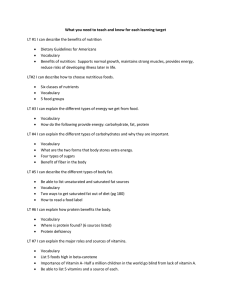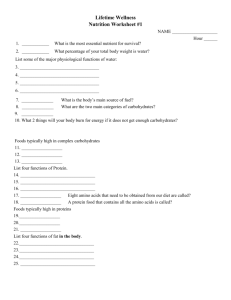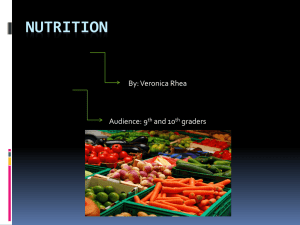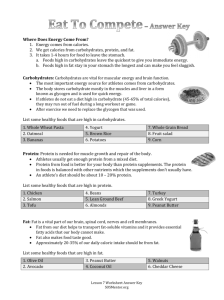Optimal Fuel for Optimal Performance
advertisement
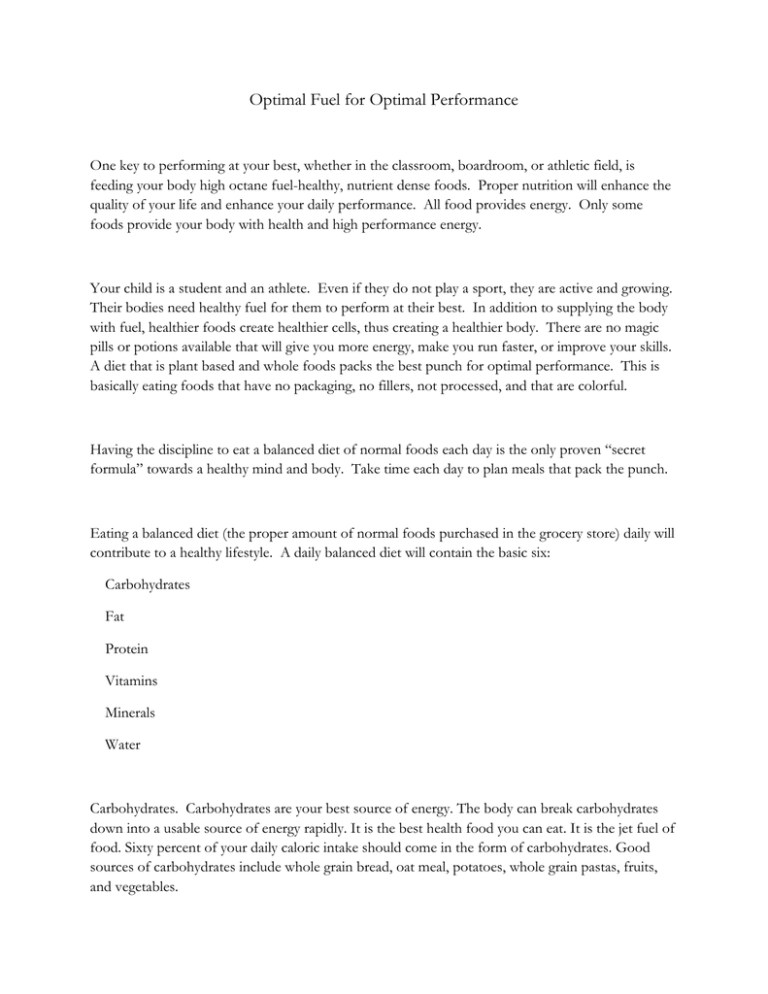
Optimal Fuel for Optimal Performance One key to performing at your best, whether in the classroom, boardroom, or athletic field, is feeding your body high octane fuel-healthy, nutrient dense foods. Proper nutrition will enhance the quality of your life and enhance your daily performance. All food provides energy. Only some foods provide your body with health and high performance energy. Your child is a student and an athlete. Even if they do not play a sport, they are active and growing. Their bodies need healthy fuel for them to perform at their best. In addition to supplying the body with fuel, healthier foods create healthier cells, thus creating a healthier body. There are no magic pills or potions available that will give you more energy, make you run faster, or improve your skills. A diet that is plant based and whole foods packs the best punch for optimal performance. This is basically eating foods that have no packaging, no fillers, not processed, and that are colorful. Having the discipline to eat a balanced diet of normal foods each day is the only proven “secret formula” towards a healthy mind and body. Take time each day to plan meals that pack the punch. Eating a balanced diet (the proper amount of normal foods purchased in the grocery store) daily will contribute to a healthy lifestyle. A daily balanced diet will contain the basic six: Carbohydrates Fat Protein Vitamins Minerals Water Carbohydrates. Carbohydrates are your best source of energy. The body can break carbohydrates down into a usable source of energy rapidly. It is the best health food you can eat. It is the jet fuel of food. Sixty percent of your daily caloric intake should come in the form of carbohydrates. Good sources of carbohydrates include whole grain bread, oat meal, potatoes, whole grain pastas, fruits, and vegetables. Fats. Fats get a bad rap. We need fats in foods, just the right type though. Unsaturated/monsaturated fats are healthy choice. Examples include olive oil and peanut oil. Peanuts/mixed nuts, fish oils, avocados are some great healthy choices Protein. Protein is primarily used to rebuild and repair muscle. It is broken down into amino acids for the muscles and other tissues to use. Lean meats, beans, nuts/seeds, fish, and chicken, and egg whites. Vitamins. Vitamins are chemicals that sustain life. They serve as metabolic catalysts that regulate all chemical reactions in the body. Vitamins do not provide energy. Food provides you with energy...not vitamins. In their book, Vitamins & Health Foods: The Great American Hustle, Victor Herbert, M.D., and Stephen Barrett M.D., state, “The RDA (Recommended Daily Allowance) for each vitamin and mineral is usually set by noting the entire range of normal human needs, selecting the number at the high end of that range, and adding a “safety factor” to allow for “reserve” body stores without risking toxicity from overdose.” They add, “For example, the range of normal adult need for vitamin C is 5 -10 mg per day. In setting the RDA at 60 mg, a 50 mg “safety factor” is added so that the body will store 1,500 mg of vitamin C, enough to last 5 months if you ate no vitamin C at all.” Minerals. Minerals are inorganic compounds (usually salts and oxides). The Food and Nutrition Board considers 16 minerals essential for humans. Minerals form structures in the body. Bones, for example, are formed with the help of calcium. Minerals also regulate body processes. For example, the iron in red blood cells transports oxygen. A balanced diet provides you with all the minerals you need. Water. The body is predominantly composed of water. All systems in the body are dependent upon water. Premature fatigue during a game and poor recovery can be the result of not drinking enough water each day. Most athletes live in an under-hydrated state, which significantly decreases the efficiency of all systems in the body. Sip water throughout the day. Dr. Pat Mann, former nutrition consultant for the Washington Capitals Hockey Team, states, “There is no fountain of youth and no magic pill or potion to enhance performance. But there is water.” She adds, “...few things cripple athletes faster than dehydration.” You don’t need to be in an exhausted state to negatively impact your performance. You lose additional water simply by breathing. Under normal circumstances, we lose 2 to 3 liters of water a day. This water must be replaced. You should consume at least two extra quarts (eight 8 ounce glasses) of water every day above and beyond what you sweat to remain properly hydrated. How do you know if your water intake is adequate? A rule of thumb you can use is the color of your urine. It should be almost clear in color. If it is bright yellow you’re not drinking enough water. Diets. Fad Diets don’t work. Instead of dieting, monitor your eating and exercise habits for the rest of your life. A very simple nutritious and highly healthy “diet” is a whole foods-plant based one. Observe the definitions given for the word diet: limiting intake of food, fast, abstinence from food, starvation. Each of these terms is a temporary condition. Losing weight is difficult. It’s easier to maintain a certain body weight. The message? Don’t gain any excess weight. A plant based (fruits, veggies, nuts, beans and whole grains) is proven to be the best nutrition to perform at your best and prevent many preventable diseases. Most people regain the weight lost within six months. Losing fat requires patience. You cannot rush the process. Do not lose more than two pounds per week. A smaller person will find it difficult to lose one pound of fat per week. You can go on a starvation diet and lose five pounds in a week. You may have lost a pound or two of fat, but the additional weight loss is muscle and water. Remember a muscle is 72% water. If you don’t take in enough calories your body will use some fat and then begin using protein (muscle) for energy. Eventually you’ll gain this weight back and then some. Starvation diets slow the metabolism down. This will make it easier to gain more weight when you stop dieting. Pre-Game or mid day snacks (60-90 minutes prior) Power foods Combine lean proteins with a fruit, a vegetable (complex carbs) *Fruit *Yogurt *Smoothie (milk, yogurt, frozen fresh fruit) *Whole grain bagel with peanut butter *Peanut butter and jelly sandwich *Fig Newton’s with milk *Clif Bar, Power Bar Game Time-Sip liquid every opportunity. Mix 2/3 Gatorade or PowerAde with 1/3 water Post-game meals should be eaten with 30 minutes after game or practice. The best post game meal to replenish the body is one glass of chocolate milk. This will help replace the body with needed fuel. Chocolate milk is a great source of needed energy after vigorous activity. The body recovers much faster. Then 30-60 minutes post game, eat a balanced meal using the ¾ plate principle: 3/4 you’re your plates should be complex carbs (colorful vegetables and fruit) and ¼ lean proteins. Rest. Rest is often overlooked because we have been led to believe that more exercise or work is better. The key to maximum gains is the proper amount of quality exercise and adequate rest. Exercise does metabolic damage to the body. This damage is repaired during the recovery phase. You don’t get stronger from lifting a weight-- overload is the necessary stimulus. Gains in strength however, are made during the resting phase. Exercise should make you feel better and perform better. The ability to increase strength, speed and conditioning levels, is dependent upon quality work, sound nutrition, your genetic makeup, and the proper amount of rest. Young athletes need a minimum of 8 hours of sleep for the body to recover, rest, and rebuild. More if they are student/athletes and playing multiple sports or teams. Rest is critical, most importantly to prevent injuries. KEY POINTS TO REMEMBER 1. More fraud exists in the area of nutrition than in any other segment of the fitness industry. 2. In most cases athletes are not reliable sources for nutrition information. 3. Supplements are not more effective than the food you buy at the grocery store. 4. Complex carbohydrates are the best source of energy. 5. Only 25% of your daily calories should come from fat. 6. Vitamins do not provide energy. 7. Eat breakfast every morning, then a small healthy snack every few hours. 8. There are 3500 calories in one pound of fat. 9. A sauna and a rubber sweat suit cause you to sweat and lose water, not fat. 10. Spot reducing is impossible. 11. There are nine calories in one gram of fat and only four calories in one gram of carbohydrate. 12. BALANCE is the key. The formula is an easy one. Make a commitment to hard work. It will require an unrelenting approach to reaching your full physical potential in all areas and sustaining those work habits under less than ideal conditions during the season. 13. Testimony from an athlete or celebrity is an opinion-not based upon facts or scientific research.

